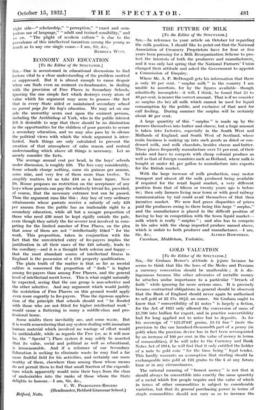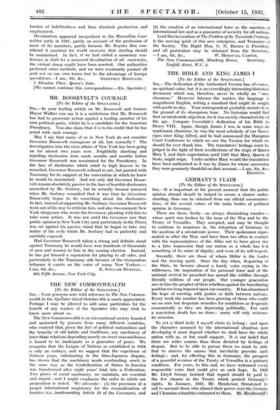GOLD VALUATION [To the Editor of the SPECTATOR.] SIR,—Sir Graham
Bower's attitude is jejune because he seems to think that like the laws of the Medes and Persians a currency convention should be unalterable ; it is dis- ingenuous because like other advocates of metallic money he attaches undue importance to a particular " breach of faith " while ignoring far more serious ones. It is precisely because contractual obligations in general should be observed that the Bank of England should never again be authorized to sell gold at £3 17s. 100. an ounce. Sir Graham ought to know that " convertibility of £1 notes " is largely a fiction, for the Act of 1925 only allowed the conversion of sums of £1,700 into bullion for export, and in practice convertibility had for long applied not to notes but to deposits. As for his sovereign of " 123.27447 grains, 11-12 fine " (note the precision to the one hundred-thousandth part of a penny (in gold) when the precious device has in fact been accompanied by an increase of 100 per cent. in the value of money in terms of commodities), if he will refer to the Currency and Bank Notes Act of 1914, he will find that it only entitled the holder of a note to gold coin " for the time being " legal tender. This hardly warrants an assumption that sterling should be exchangeable into gold at 123 grains to the at any future time or in any circumstances.
The rational meaning of " honest money" is not that it should always be convertible into exactly the same quantity of a metal which few people require and the value of which in terms of other commodities is subject to considerable variation, but that its general purchasing power in terms of staple commodities should not vary so as to increase the burden of indebtedness and thus diminish production and employment.
Devaluation appeared inexpedient to the Macmillan Com- mittee early in 1931, partly on account of the profess-ion of most of its members, partly because Mr. Keynes then con- sidered it essential for world recovery that sterling should
be maintained. In fact, if we had called a monetary con- ference in 1929 for a measured devaluation of all currencies, the violent slump might have been averted. Our authorities preferred other methods, and we were eventually pushed off gold not on our own terms but to the advantage of foreign speculators.—I am, Sir, &c., GEOFFREY BIDDULPIL 1 Elvaston Place, Queen's Gate.
[We cannot continue this correspondence.—En. Spectator.]



























































 Previous page
Previous page